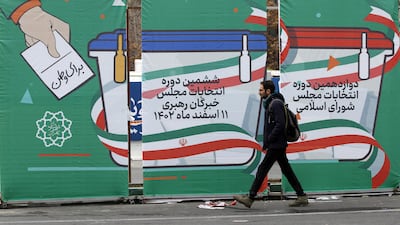More than half of Iranians currently disapprove of their country’s leadership, according to a new Gallup poll released a day before the country heads to the polls for parliamentary elections.
The election on Friday is Iran's first since a nationwide uprising sparked by the death of Mahsa Amini in police custody in late 2022. While those protests were violently suppressed after several months, widespread discontent remains over the state of the economy, tensions with the West over Tehran's nuclear programme and Iran's support for Russia in its war with Ukraine.
The Gallup poll found that a slim majority of Iranians – 52 per cent – said they disapprove of their country’s leadership, while 43 per cent approved.
Dissatisfaction was higher among Iranians under the age of 30 – a key part of the protest movement after Ms Amini’s death, with 61 per cent saying they disapproved of their leadership, according to Gallup. Data from 2023 also showed that 26 per cent of Iranians would like to move permanently to another country, more than double the rate in 2014 when it was at 12 per cent. More than two in five Iranians aged 15 to 29 – 43 per cent – said they would also like to move abroad permanently.
Iranians face higher food prices compared with the rest of the region, with the inflation rate staying above 40 per cent for several years, as the economy remains under sustained pressure from US-led sanctions.
With high inflation putting pressure on household budgets, three in five Iranians (61 per cent) said they found it difficult or very difficult to get by on their current incomes, Gallup said – the highest level since it started surveying Iran.
After a record-low voter turn-out in the 2021 presidential election, officials have urged people to come out to vote on Friday. As opposed to previous elections, no information has been released this year from the state-owned polling centre, ISPA, about the expected turn-out.
More than 15,000 candidates are vying for a seat in the 290-member parliament, formally known as the Islamic Consultative Assembly. Terms run for four years and five seats are reserved for Iran's religious minorities.
Under the law, the parliament has oversight over the executive branch, votes on treaties and handles other issues. In practice, absolute power in Iran rests with its supreme leader, Ayatollah Ali Khamenei.
“Iran heads into its latest vote facing numerous pressures, internal and external. While it suppressed the popular uprising of 2022 after Amini’s death, Iran’s leadership continues to receive higher disapproval than approval – notably lower than its close trading partner, China, does,” said Benedict Vigers and Julie Ray, the authors of the Gallup survey.
Hardliners have controlled the parliament for the past two decades – with chants of “Death to America” often heard from the floor.
Under parliament speaker Mohammad Bagher Qalibaf, a former Revolutionary Guard general who supported a violent crackdown on Iranian university students in 1999, the legislature pushed forward a bill in 2020 that greatly curtailed Tehran's co-operation with the UN nuclear watchdog, the International Atomic Energy Agency.
More recently, the parliament has focused on enforcement of Iran's mandatory headscarf, or hijab, for women. The issue came into focus after the death of Ms Amini, who was detained for allegedly not wearing her hijab properly.


